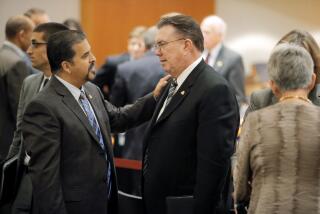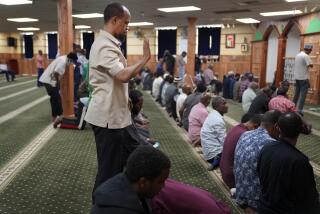Prayer Discussed at Religious Gathering
An attorney active in religious liberty issues told the 21st annual San Fernando Valley Prayer Breakfast on Thursday that the freedom to pray in public settings is much better established in law than most people realize.
“We’ve swallowed the line that prayer, even silent prayer, is to be kept in the closet,” said Brad W. Dacus of Sacramento, western regional coordinator of the Rutherford Institute, a conservative legal-defense agency based in Charlottesville, Va.
Dacus spoke to more than 400 people attending the breakfast at Sportsmen’s Lodge as part of the National Day of Prayer, designated by Congress in 1988 as the first Thursday in May.
Similar breakfasts were held in Glendale, La Crescenta, Palmdale and Lancaster, among other locations.
Citing examples of legal prayer in California, Dacus said government meetings may be opened with prayer and civic officials may pray at private meetings as long as they are not standing on a podium with a city’s seal visible (implying government endorsement). Also, “if governments open public buildings for other groups, they may not exclude religious groups” from using the facilities, he said.
Faith groups, however, are sometimes asked to not be “too religious” in such settings, Dacus said. Unwarranted restrictions often come about, Dacus asserted, because “religious discrimination is rampant in the country right now.”
After reading Scripture for the breakfast meeting, Matthew K. Fong of the State Board of Equalization, a Republican aspirant for the state treasurer’s post, drew cheers from the audience when he spoke of his desire to “bring the opportunity to pray in schools.”
Organized classroom prayer in public schools, barred by U.S. Supreme Court rulings, is supported by most boosters of National Day of Prayer observances but opposed by religious leaders who favor church-state separation.
More to Read
Sign up for Essential California
The most important California stories and recommendations in your inbox every morning.
You may occasionally receive promotional content from the Los Angeles Times.










